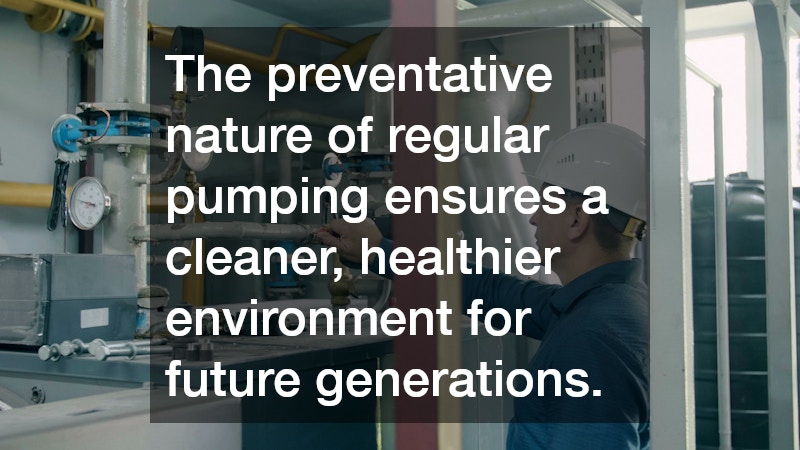The Importance of Regular Septic Pumping
Maintaining your septic system might not always be at the forefront of your mind, but its importance cannot be overstated. Regular septic pumping is crucial not only for preventing costly repairs but also for avoiding environmental impacts that can affect your property and the surrounding community. Understanding the intricacies of your septic system can help you appreciate the benefits of routine maintenance and take proactive steps to preserve its longevity.
1. How Often Should I Pump My Septic Tank?
A. Factors Influencing Pumping Frequency
The frequency of septic tank pumping can vary greatly depending on several factors. Household size plays a significant role, as more people generate more wastewater, thus filling up the tank faster. Furthermore, the volume of wastewater produced and the overall system size must also be considered to determine the most appropriate pumping schedule.
Other variables that influence pumping frequency include the amount of solid waste generated and the presence of water-saving appliances. For instance, homes with high-efficiency toilets and dishwashers may produce less wastewater and can potentially extend the time between pumps. Additionally, the habits and lifestyle of the occupants can impact how quickly a septic system requires attention.
Ultimately, understanding these factors can help homeowners create a customized maintenance plan. By considering all relevant aspects, such as household size and the type of appliances used, property owners can ensure that their septic systems are maintained in optimal condition. A thoughtful approach to maintenance can significantly reduce the risk of unexpected failures and ensure the longevity of the system.
B. Signs Your Septic Tank Needs Pumping
Identifying signs that your septic tank needs pumping is essential to prevent issues before they escalate. One common indicator is slow drains throughout the property, which signal that the system is struggling to process wastewater efficiently. Unusual odors emanating from drains or the yard may also indicate a full septic tank nearing its capacity.
In some cases, water pooling in unexpected places around the yard can be a telltale sign of septic system distress. This occurs when the tank is overfilled, causing effluent to spill into the surrounding soil. Recognizing these warning signals can give homeowners the opportunity to address problems promptly, minimizing any potential damage.
Regular observation and attention to these signs can safeguard a household against septic system failures. By staying vigilant and responsive to the signs of a full tank, homeowners can engage septic pumping services before severe complications arise. A proactive approach ensures the system remains in good working condition for years to come.
C. Recommended Pumping Schedule
Industry experts often recommend a pumping schedule to help homeowners maintain their septic systems effectively. Generally, it is advisable to pump every three to five years, depending on usage and specific system characteristics. Regular pumping prevents the accumulation of solids, which can cause blockages and system damage.
While the general recommendation provides a solid baseline, it is important to adjust the schedule according to personal circumstances. Factors such as the number of occupants and the frequency of guests can require more frequent pumping intervals. Engaging a septic professional to assess your system and provide tailored advice can be beneficial.
3. What Are the Benefits of Regular Septic Pumping?
A. Prolonging System Longevity
Regular septic pumping serves as a preventative measure that significantly extends the lifespan of the system. By removing sludge and preventing the buildup of solids, regular maintenance reduces stress on the system’s components. This proactive approach prevents wear and tear, helping to avoid premature replacements.
Routine pumping allows professionals to inspect the system and address any emerging issues promptly. Early detection of potential problems ensures that small repairs can be completed before they escalate, preserving the system’s functionality. Homeowners who adhere to maintenance schedules enjoy the peace of mind that comes with a well-maintained septic system.
Prolonged system longevity translates to delayed replacement costs, providing financial savings over time. The initial investment in regular pumping ultimately pays off by avoiding the need for a complete system overhaul. By extending the life of the septic system, homeowners uphold the value and functionality of their properties.
B. Improving System Efficiency
Regular septic pumping enhances system efficiency by ensuring optimal waste processing. When tanks are regularly emptied, they can better filter and treat wastewater, preventing blockages and backups. This improved efficiency results in smoother operations and fewer disruptions to daily life.
Maintaining an efficient septic system also reduces the likelihood of unpleasant odors and slow drains, enhancing the overall comfort of the home. Homeowners can enjoy a cleaner and more hygienic environment, free from the inconvenience of system failures. Efficient waste management also reduces environmental impact, contributing to a healthier ecosystem.
With regular pumping, households save on energy consumption due to the smoother operation of waste processing activities. When the system is functioning optimally, there is less need for overexertion of motors and pumps. Improved efficiency benefits both the household and the surrounding environment.
C. Protecting Property and Environment
Consistent septic maintenance protects both the homeowner’s property and the broader environment from potential contaminants. By keeping the system in top condition, septic pumping prevents sewage leaks and minimizes the risk of contaminated water sources. Protecting the environment is a significant responsibility shared among all property owners.
Homeowners who invest in regular septic maintenance help preserve the natural beauty of their surroundings by preventing unintended pollution. Protecting local ecosystems from harmful wastewater and contributing to community wellbeing are primary goals of diligent septic care. The preventative nature of regular pumping ensures a cleaner, healthier environment for future generations.
Regular septic pumping is not just a routine chore, but a critical aspect of home maintenance that delivers extensive benefits. This systematic preventive measure ensures system longevity, improves efficiency, and protects both property and the natural environment. By viewing septic maintenance as a valuable investment, homeowners can preserve property value and contribute to community health, fostering a culture of responsible stewardship for future generations.




Post Comment